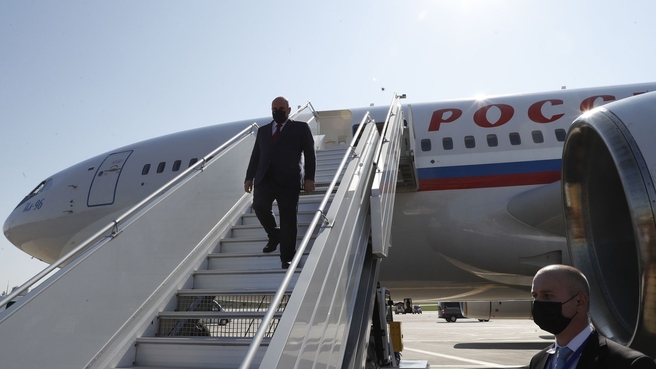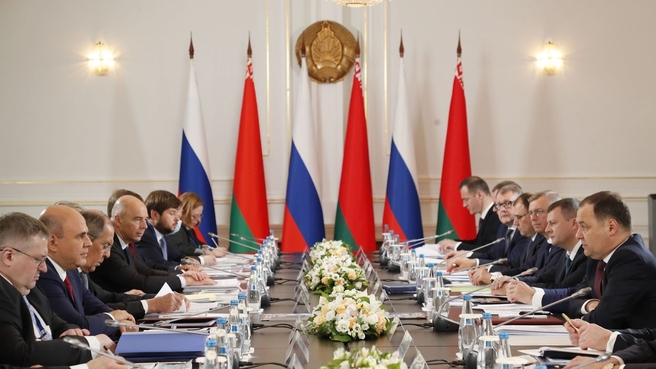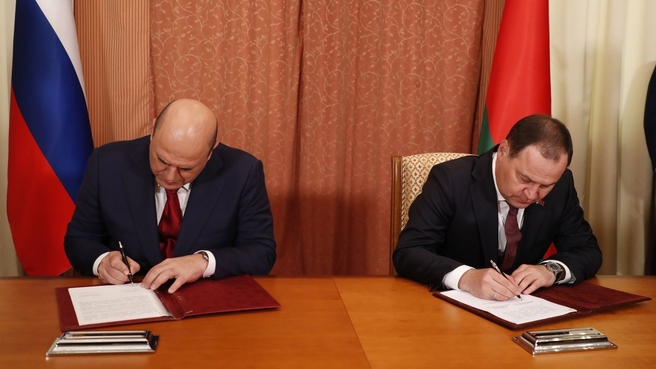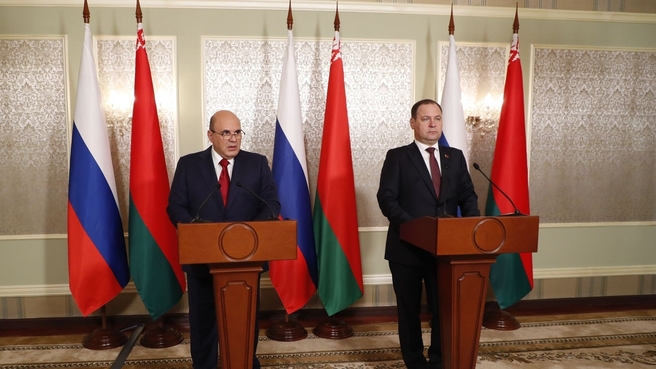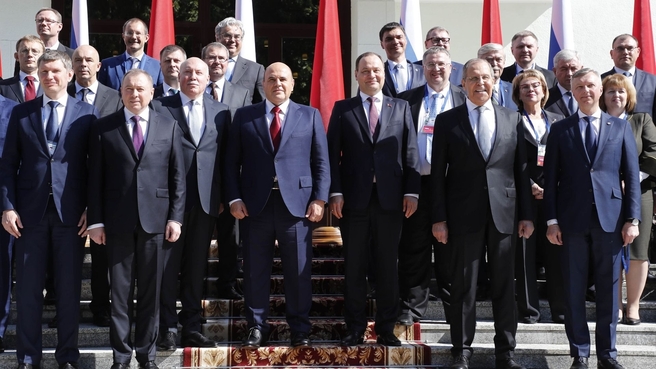Mikhail Mishustin:“The presidents of Russia and Belarus, Vladimir Putin and Alexander Lukashenko, met yesterday in Moscow. The leaders of our countries adopted a critical decision to deepen integration within the Union State. Our objective is to implement the agreements reached at the highest level.”
Meeting of the Council of Ministers of the Union State
Documents signed following the meeting of the Council of Ministers of the Union State
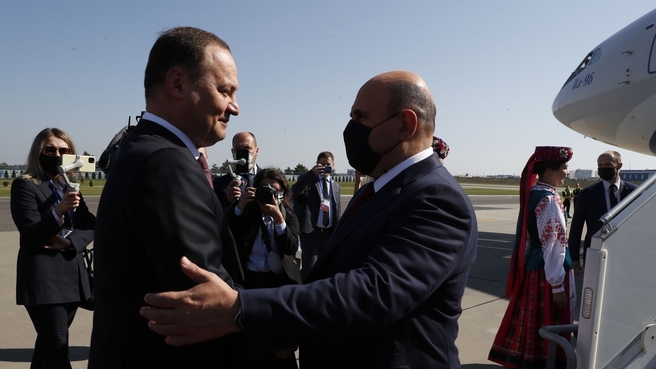
Mikhail Mishustin and Prime Minister of Belarus Roman Golovchenko before a meeting of the Council of Ministers of the Union State
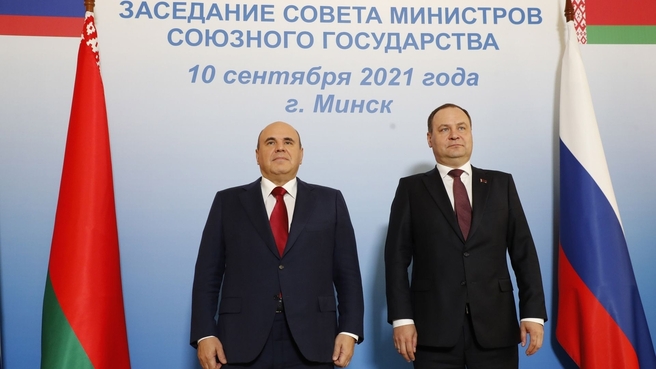
Mikhail Mishustin and Prime Minister of Belarus Roman Golovchenko before a meeting of the Council of Ministers of the Union State
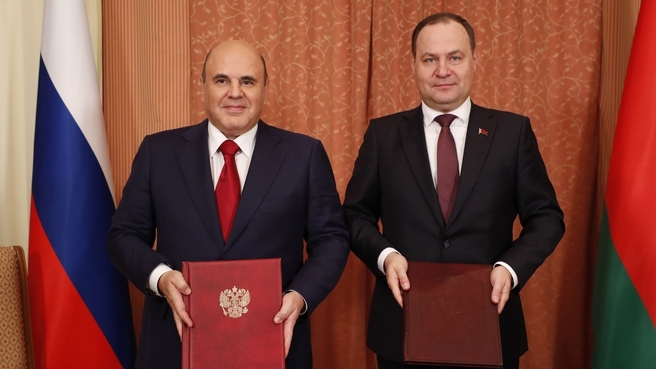
Mikhail Mishustin and Prime Minister of the Republic of Belarus Roman Golovchenko sign the documents adopted at the meeting of the Council of Ministers of the Union State
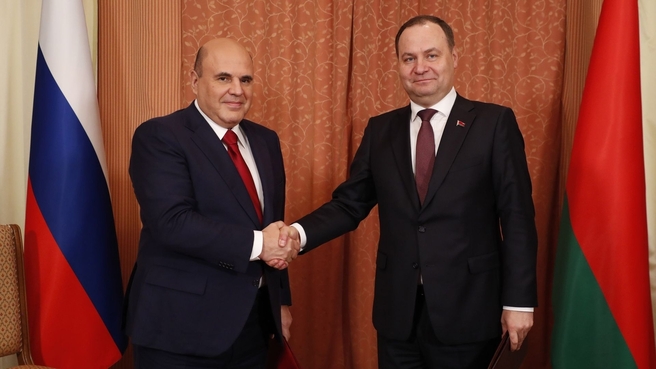
Mikhail Mishustin and Prime Minister of the Republic of Belarus Roman Golovchenko sign the documents adopted at the meeting of the Council of Ministers of the Union State
Mikhail Mishustin arriving in Minsk for a meeting of the Council of Ministers of the Union State
Good afternoon, Mr Golovchenko, Mr Mezentsev, colleagues, friends.
First of all, I would like to thank our Belarusian colleagues for the warm welcome and the outstanding organisation of the meeting.
The presidents of Russia and Belarus, Vladimir Putin and Alexander Lukashenko, met yesterday in Moscow. The leaders of our countries adopted a critical decision to deepen integration within the Union State. Our objective is to implement the agreements reached at the highest level.
That is why today’s meeting of the Council of Ministers of the Union State has a special value for the development of the brotherly Russian-Belarusian relations. We are sincerely interested in bringing our cooperation to a new level and boosting the integration processes in the Union State.
Today’s agenda features only one issue. We are to approve the Main Areas for the Implementation of the Terms of the Treaty on the Creation of the Union State for this year and the next two years, as well as 28 sectoral union programmes. They were developed by not only government agencies, but also banking structures and business circles. The opinions of the citizens of our two countries were also taken into account, for it is they who are supposed to feel the positive impact of the integration processes.
All union programmes are fully coordinated. It was complex and ambitious work that required a lot of time and effort and involved practically all ministries, departments and federal executive bodies in Russia and Belarus.
I would like to thank everyone who has contributed to this great common cause. We hope that in the near future the documents will be approved by the Supreme State Council under the leadership of Presidents Vladimir Putin and Alexander Lukashenko. This will create a reliable legal basis for joint work to strengthen Russian-Belarusian integration.
Our common goal is to improve the standard of living of every citizen in both countries. This can only be achieved by ensuring the growth of our economies. We must create a single space based on the principles of openness, transparency and mutual trust, and on rules that take into account the interests and needs of residents and entrepreneurs. And of course, while fully preserving the sovereignty of our states.
The union programmes which I spoke about are aimed at addressing precisely these tasks. They envisage a convergence of macroeconomic policies, the bringing about conditions to support not only large, but also medium-sized and small businesses, which is very important, and the creation of more jobs.
Russian businesses will have a green light to expand activity in Belarus – start new joint ventures and boost exports.
The Belarusian side will gain access to Russian government procurement, support measures, and subsidies, as well as a bigger market for industrial and agricultural products. Belarusian players will be able to use a simplified procedure to raise Russian investments and funding from development institutions.
We will definitely strengthen cooperation in the energy sector. I am referring to the formation of unified Union State markets for electricity, gas, oil and petroleum products.
Harmonising monetary policies is an essential part of the integration process. We need to prepare and sign an appropriate interbank agreement to bring the information security requirements in the financial sector into line and to set up mechanisms for integrating the payment systems. This is very important for the convenience of both individuals and businesses.
The tax and customs systems will be synchronised within the Union State. These issues caused a lot of debate and ideas, but we have managed to come to an agreement and find mutually beneficial solutions.
Now we need to promptly prepare for signing an agreement on general principles of levying indirect taxes (an international agreement, with exemptions, but we already have an understanding of the main approaches to it) and introduce an integrated system for their administration. This work should be coordinated by a joint body, the Union State Committee.
As for the customs system, the implementation of the relevant Union programme will enable the Russian and Belarusian services to act as one team. Common approaches to accounting for the flow of goods in mutual trade will ensure equal conditions for doing business.
The Union programmes are aimed at deepening industrial cooperation. We will make use of our companies’ objective competitive advantages and stimulate the creation of joint ventures. We will remove the existing administrative barriers.
To improve and expand mutual trade in agricultural produce, we will adopt a single agro-industrial policy. Both Russia and Belarus have good results in the agricultural sector. By combining our efforts and adding new technologies to the equation, I am sure we can achieve even greater success.
In the transport sector, we are going to increase the number of rail routes connecting cities in Russia and Belarus, even despite the coronavirus pandemic. Moreover, taking into account the epidemiological situation, our presidents have made a principled decision to fully resume air traffic between our countries from airports that are also open to international flights.
The Union programmes include other steps when it comes to transport. We will conclude an intergovernmental agreement to allow our haulage companies to transport goods without any special permits; we will work out a package of measures to deepen cooperation in air, rail, sea and road transport services. Indeed, without a single transport space, it is impossible to develop free trade, the labour market, tourism, or business.
And of course, citizens of Russia and Belarus should have opportunities to communicate. Reliable communication is important for business, too. We believe we need to standardise the legislation regulating postal services and the development of the communications infrastructure. This should minimise the cost of mobile roaming across the Union State.
Again, the positive aspects of integration should first of all become tangible for the citizens of Russia and Belarus. So we need above all to prioritise the problems that concern them. People need to have the opportunity to work anywhere in the Union State, make money, receive pensions, and enjoy social support. All this should be established on an equal footing.
As part of the implementation of the Union programmes, we will agree on common approaches to harmonising our laws that regulate labour relations, workplace health and safety, employment, social security, pensions, and support for families with children.
I am confident that people in Russia and Belarus will appreciate this significant step. We will also deepen cooperation in education and healthcare, and strengthen our contacts when it comes to science, culture and sports. We place special importance on these areas as well.
Colleagues, we have a lot of work ahead. We need to fulfil all the agreements reached. The Governments of Russia and Belarus need to focus on this. We will have to act in difficult conditions. I am referring to the unstable external situation caused by the coronavirus as well as the illegal unilateral economic sanctions imposed on Russia and Belarus.
History has proven that the Russian and Belarusian peoples are not afraid of difficulties. On the contrary, trials bring us together and strengthen our determination to work for the benefit of the Union State citizens.
The fraternal relations that bind Russia and Belarus are based on mutual affinities and deep-rooted respect between our peoples. As the experience of coordinating the Union programmes has shown, we are capable of negotiating and finding effective compromise solutions. I am sure that this will help us to overcome any challenges and attain our ambitious strategic goals.
Mr Golovchenko, I am giving the floor to you now.
Roman Golovchenko: Mr Mishustin, Mr Mezentsev, participants and delegation members,
I am very glad to greet you on Belarusian soil, at, dare I say it, this long awaited meeting of the Council of Ministers of the Union State. As my colleague, Mr Mishustin, noted, we have come a long way in the course of our union development. It has been complicated and productive. We have established the necessary legal and contractual framework and created conditions for securing equal social and economic rights for our citizens. This is the basis from which we started creating the Union State.
We have provided for a systemic interaction in foreign and defence policy. The leaders of our states spoke about this yesterday. We have been maintaining and increasing high volumes of mutual trade, implementing joint programmes and putting landmark projects into operation, including in nuclear power engineering and space.
There is no doubt that it is critical to make the union of Belarus and Russia a locomotive of integration processes in the post-Soviet states after creating the necessary prerequisites for the emergence of a potent modern economic inter-state entity – the Eurasian Economic Union.
And today, given the unprecedented pressure from third countries, our bilateral relations have passed the test of strength. I can point out with satisfaction that in all acute issues we have been able to find solutions and support, which enables Belarus to maintain positive dynamics in its economic development and provide social security for the population.
Thanks to the adopted measures, trade between our countries went up by 35 percent, amounting to about $18 billion in the first six months of the year. I want to stress that the Russian Federation accounts for practically a half of the foreign trade of the Republic of Belarus. Belarus, in its turn, is one of the five countries with which the Russian Federation has the largest volume of trade.
Last year, we quickly responded to the new epidemiological challenges and took joint measures to minimise the unfavourable effects of the coronavirus infection. I want to express our appreciation to the Russian side once again for the vaccine supplies and the transfer of its production technology to our country. We are active in immunising the population and hope to gradually reach herd immunity, which would reduce this problem.
I also want to thank you for resolving some issues concerning the lifting of a number of restrictions on travel between our countries and maximum use of Belavia Belarusian Airlines. I hope that similar decisions will be taken soon with respect to other transport areas.
Friends,
Today, we are to take yet another notable step in strengthening and developing the Union State. A package of documents determining the further direction of integration cooperation in the framework of the Treaty on the Creation of the Union State has been submitted for approval by the Union State Council of Ministers. The proposals to resume the practical work of implementing the provisions of this important document were made for the first time at a meeting of the Union State Council of Ministers in Brest in December 2018. The presidents of both countries supported this initiative, thereby launching large-scale work on this programme.
Today, we have reached an important intermediary step in this work, albeit not the final step yet. We have approved the drafts of the main areas of implementing the terms of the Treaty on the Creation of the Union State and 28 Union State programmes, as you mentioned Mr Mishustin. In effect, the governments of the two countries have conducted an inventory of the provisions of the treaty. Using this as a foundation, they created a new list of tasks on further developing relations with the unconditional preservation of both political and economic sovereignty. This is a response to those who are making political insinuations about the integration in the Union State. There is no doubt that the implementation of the documents that will be endorsed today will obviously benefit our citizens and substantially increase their living standards.
Harmonising legislation in the key economic sectors is a point of departure in this latest stage of integration. The package of documents drafted by the governments is designed to further develop our joint economic space, form unified sectoral markets, and implement a uniform financial, tax, credit, price and trade policy.
In the opinion of Belarus, the implementation of the union programmes will allow the two countries to continue improving their relations in money-and-credit regulations, to bring their tax systems closer, and increase the level of cooperation between their ministries and departments, in part, through the latest digital technology.
We are set to create a completely new environment in trade for most goods and services that will provide free access to our markets.
Much attention was paid to the development of industrial cooperation and ensuring food security, as has already been mentioned.
Energy cooperation plays an important role. Of course, the two countries will focus on evening out the socio-economic conditions of their people and further expanding their reciprocal rights and freedoms in the territories of both states.
I hope to express the collective opinion of the Belarusian delegation that the implementation of the adopted documents confirms that the Union State format is relevant, topical and promising.
I would like to emphasise that the provisions of the union programmes are consonant with the ideas of building the Eurasian Economic Union and are even ahead of them in some respects.
Large-scale intensive work is lying ahead on implementing the agreed upon plans and tasks. I am confident that we will fulfil everything in full and as scheduled.
We are determined and committed to doing this. We know that we are ready for action and confident that we will be able to do all we have planned, especially considering the enormous preparations for this. I would say we are on the same wavelength. This is very important. This is the approach of the Government of the Republic of Belarus.
***
Documents signed following the meeting of the Council of Ministers of the Union State:
Resolution of the Council of Ministers of the Union State on the Main Areas of Implementing the Provisions of the Treaty on the Creation the Union State in 2021-2023
Joint Statement by the Prime Minister of the Russian Federation and the Prime Minister of the Republic of Belarus on the Current State and Further Steps to Deepening Integration in the Union State
